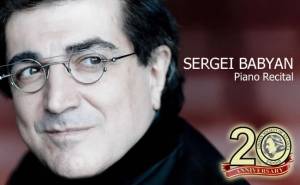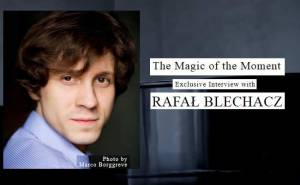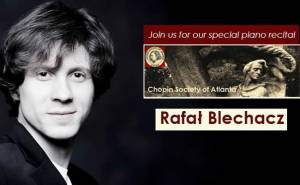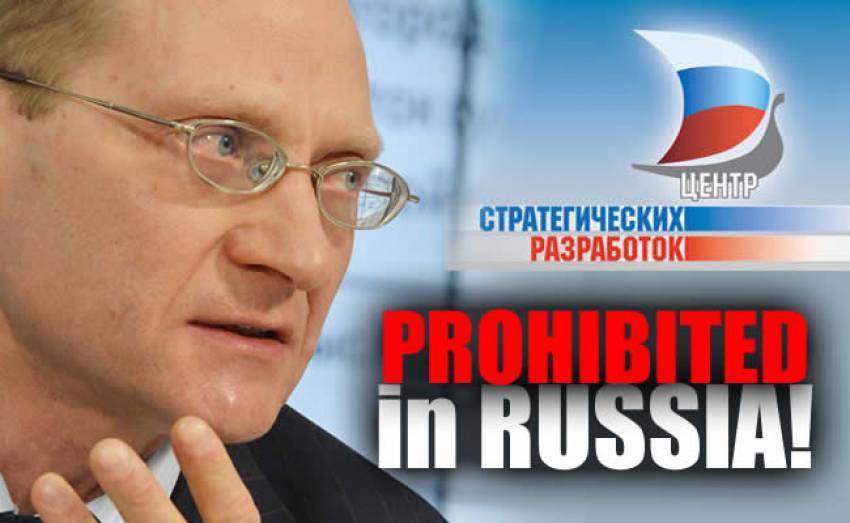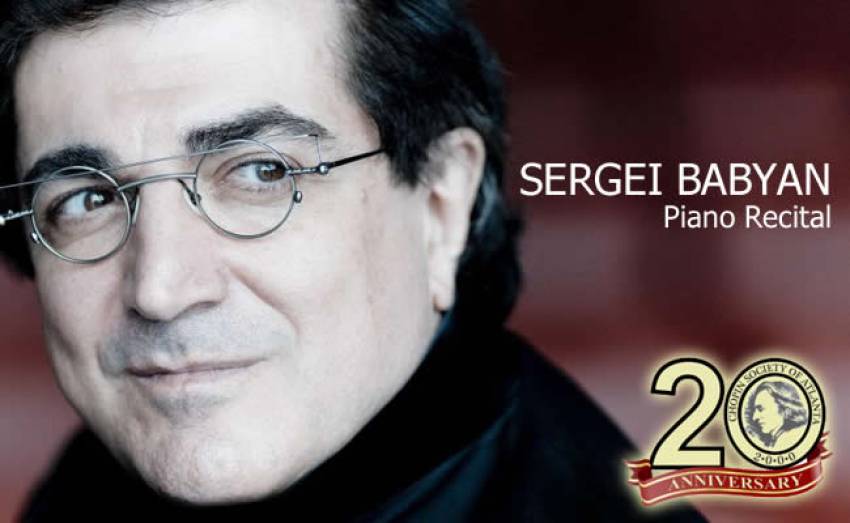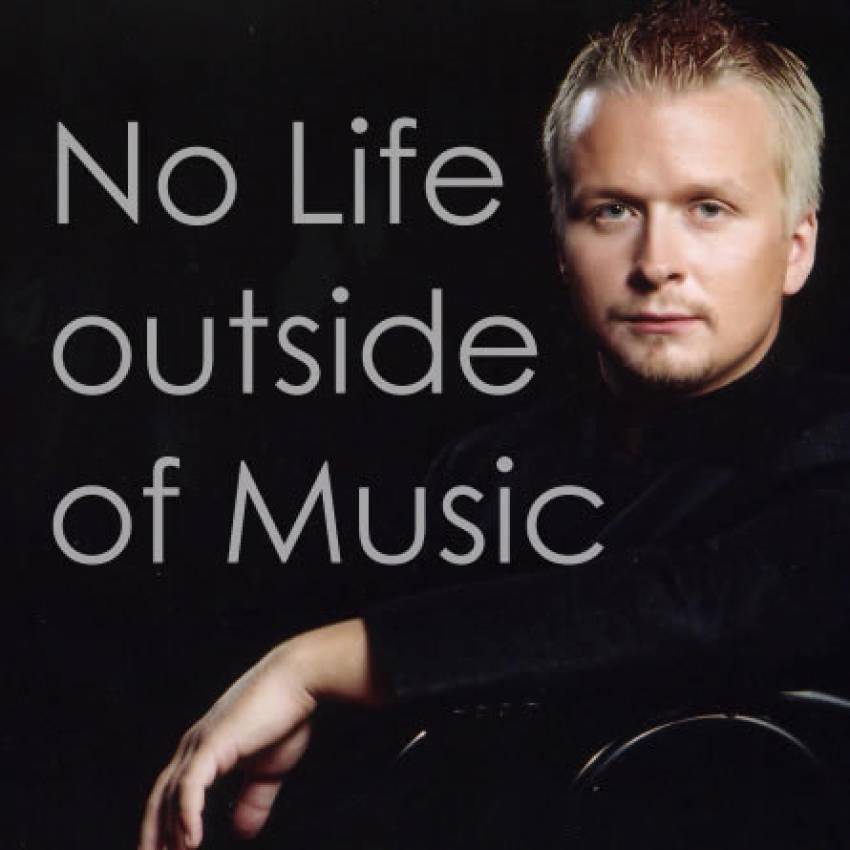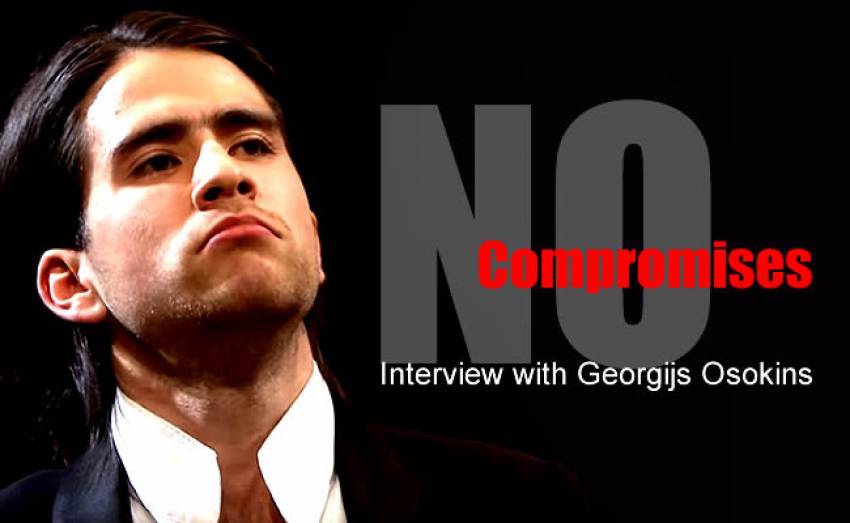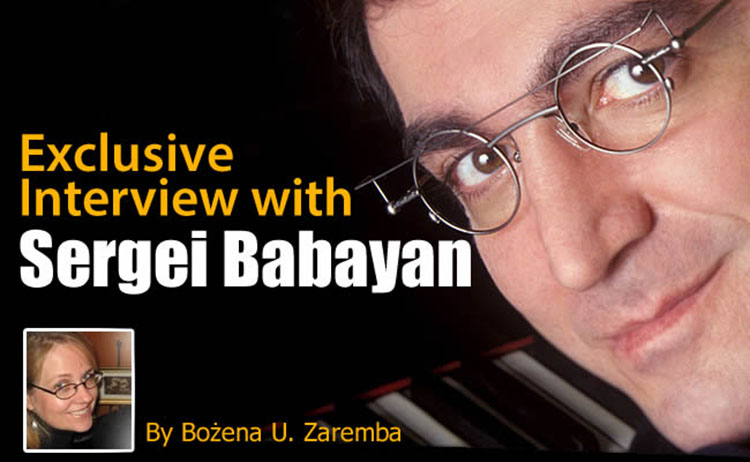
Bożena U. Zaremba: Judging from how hard it was to schedule an interview with you, I conclude you are an extremely busy person. Is it primarily music that fills your life?
Sergei Babayan: Yes, it is only music—mostly practicing—especially before a recital. At such times, I turn my phone off because if I leave it on, I get distracted all the time and cannot focus. That’s why I am hard to reach.
Do you have a routine for your practice?
Routine? Yes, you could say that, but I don’t like the word “routine” because practice is a creative process. It of course depends on what you do. For instance, when I memorize, I learn by taking some sections. I never play too many times, though. It is useless, because a pianist is like a painter—you need to step back. You cannot just paint and paint; you need to look at it from different perspectives. It is the same in music: When you memorize a piece, you learn small sections, and you need to take a break. Reading a good book can be a good diversion; so can taking a walk in nature. If we specifically talk about memorization, there are several types of memory: tactile, intellectual, emotional. Then there is photographic memory, and all these are used. But there is no routine to utilize these types of memory, because each day you are in a different condition. Sometimes it is easier to do it photographically, but sometimes it is easier to do it even without a piano, by looking at the score like a conductor. I try to draw from my experience, and I always use the tools that worked for me in the past, but I also try to create something new. So, yes, there is routine but there is always breaking of that routine. Once you repeat yourself and try to do what you did even five minutes ago, it is not interesting or inspiring any more.
When inspires you more, practice or performance?
I love the process of practicing, especially immediately before a recital, maybe because of stress and your desire to do your best and because you really focus on the program. For some reason, before a recital you get so many new ideas to try out, you virtually get drunk with ideas, and when the recital comes, you get sober, and that sobriety tells you which ideas were fresh and innovative and which were just an illusion. With my very close friend, we created an idea of a so-called ''three-day theory'': Three days are needed to realize if your idea will work or not, if it was just a delusion or a spark of genius. The greatest moments are when you discover something and then think, “How could I not know this before?” That’s why work is so important. I think it was Tchaikovsky who once said “Inspiration is a guest that does not willingly visit the lazy.” This is a wonderful idea, and every composer knows about it. There are days when you create a masterpiece and days when you don’t, but you work, you exercise, you write canons, counterpoints, fugues. It keeps you in shape so when the inspiration comes to you, you are ready. Recently I had to memorize Rachmaninoff’s 4th [Piano Concerto] in a very short time. I had only one month before the concert. Even with the best planning, there was no time to learn the piece ahead of time. I had other engagements, and had to practice other programs. But eventually, I appreciated those concerts very much. I had been playing different programs every day, one after another, and was in the best pianistic shape, and as a result, I was able to memorize it in only 18 days.
Is there a danger of overexerting oneself?
Of course, especially when the work is physically demanding, but I cannot imagine overworking on Bach’s preludes and fugues, though. If I didn’t need to sleep and rest, I could play those pieces 24 hours a day. I play this voice or that voice, left hand or right hand, and I don’t get exhausted physically or mentally. They inspire me so much, and I feel blessed, privileged to touch this music. But with such works as Liszt’s Transcendental Etudes, Prokofiev’s Concerto No. 2 or Rachmaninoff’s Concerto No. 3, I cannot work more than a certain number of hours. I need a break.
It’s almost like an athlete.
Exactly. If you play Chopin’s Etude No.2, op.10, for example, there are certain parts you need to get very comfortable with because at the beginning they are not comfortable. So if you play for an extensive time the same passage that requires repetitive use of the same muscle, you can get into serious problems.
What are your favorite ways for physical recovery?
Most pianists do yoga or swim. I like swimming. I feel rejuvenated after that.
Let’s talk about your fascinating, though not unusual biography. You were born in Armenia, when it was still a Soviet republic, were educated in Moscow, and now live in America.
I was born in the Soviet Union, unfortunately and fortunately. Unfortunately, because I absolutely detested the communist regime. It was not even a matter of choice. I did not feel comfortable living there. Fortunately, because of Russia’s high and unique culture, music, literature. And the [music] education was the best. It was well-rounded. You would learn to read music, learn solfège, as well as music literature and theory. Here, I sometimes see disturbing things. They bring me gifted students [to evaluate], and I find out that they don’t know the basics: cannot read music, have no knowledge of harmony, cannot improvise, and don’t know music literature. I recently had a student who wanted to enroll in my studio at the Julliard [School] and didn’t know Beethoven’s sonatas! I asked him which key it is in, and he couldn’t answer that basic question! It’s crazy! In that respect, education in Russia was absolutely fantastic. I feel privileged that I was part of that and will always be grateful for that and to the teachers I had there.
So what bothered you most?
It was a certain lack of respect for other human beings, which was far from my philosophy though I did not know the western world because I had no opportunity to travel. But somehow from the literature and intuitively, I knew I would feel more comfortable in London, Paris, or New York than I felt in Moscow. So when I won my first competition, I didn’t have any second thoughts and left. I immediately fell in love with people, their kindness and desire to help each other. I appreciate the way people respect other people’s space and privacy.
Do you still feel Armenian?
Absolutely. I am Armenian; I grew up in Armenia; I listened to Armenian folk music and the language. I was always drawn to the high Armenian [language]. In Armenia there are seminaries, where priest learn this higher Armenian language and where education is of a completely different caliber. I remember I once I went to a lecture given by a young priest from such a seminary on architecture and paintings that are in some churches. I was mesmerized by the way he spoke Armenian, completely hypnotized, and I understood what a fantastic language is part of me. Unfortunately, I never learned Armenian on that level of seminary education, but I read books and I adore it. I am Armenian 100%. Armenia has an incredible past and a tragic past, of course. I am proud of the Armenian culture and rich tradition in philosophy and poetry. As for classical music, we have [Vartapet] Komitas, this fantastic, great gem of Armenian music. At the same time, I don’t have a sharp national identity, I feel absolutely cosmopolitan. The music that inspired me to be a pianist was Rachmaninoff, and the music I first fell in love with was Tchaikovsky. The music that first spoke of love was Chopin. Of course, Bach and Mozart were always with me. I think classical music is cosmopolitan, but growing up in Armenia had a huge impact on me and made me different.
Talking about Chopin, what is so special about his music?
Wow! That’s such a huge question. Where do I start? Many things are special, as in all geniuses. First of all, the intensity of the way he felt life and the way he could express this in his ingenious music, in harmony, in his melodies. When I try to find elements that are close to me, it would be the certain nostalgia, and love, and pain, and happiness, and elegance, and effortlessness, and the impeccable taste and perfectionism to the extent that you start to wonder, was it a human being who wrote this music or was it dictated from above? He has a capricious nature; when you do a little too much, it immediately “takes revenge on” you. Beneath the seemingly simple and transparent expression, there is a most complex emotional world. Then comes this effortlessness, as in Mozart. And then, of course, there is his disease and [physical] frailty, and deep nostalgia and pain as he was forced to leave his homeland, and going back was not an option. These are the things that touch me deeply. And he was a philosopher, but not in an intellectual sense; it is more intuitive, and you can see this in some of his slow movements. So what can I say? He is among the greatest.
In your rendition of a mazurka that I heard, you seemed to be treating Chopin’s music with great caution, just as when one handles a delicate flower, afraid of hurting it.
Because when I play Chopin’s music I feel like I am touching something sacred. This music does not let you be brutal or vulgar. It immediately punishes any insensitivity or insincerity. You can never say you have it. The moment you become conceited and say, “Yes, I know what to do,” it punishes you. In the same way, sometimes you play it for many hours and you start to think you should not be playing this music, and you become depressed and are almost ready to give up, and then it suddenly comes to you with new ways [of expression]. So the relationship is like with a beautiful though extremely capricious woman.
2015 is the year of the International Fryderyk Chopin Piano Competition in Warsaw. Some of the online watching options, such as YouTube, will be available for the first time. Are you going to watch?
Yes, definitely. I was a guest at the Competition in 2005, and the atmosphere in Warsaw [during the Competition] is fantastic. Every little shop you go to, you hear Chopin’s music. But during the last Competition, in 2010, when one of my students, Daniil Trifonov, was there, I could not be in Poland, so I was following it through a live broadcast online. I must say I did not miss the concert hall. The camera is very close to the pianist, you can see the hands and the face, and if you have good-quality speakers you get a heavenly experience. I don’t need to be there when somebody’s coughing or dropping the keys, or a phone is ringing. When you watch online, you can focus. You can stop any time and go back, and if you don’t like the pianist, and very often after hearing a pianist for two seconds, I realize that I don’t want to hear this pianist ever again, I am not stuck in the hall for another half of an hour, pretending that I am listening.
In general, are you in favor of technological innovations in music?
Yes, absolutely. It of course depends how you use it. If it brings us closer to culture, if we get a chance to download music in a split second, for example, it is fantastic. But when they try to replace the live performance with editing, and technology takes you away from the live performance and makes it all fake, I am not in favor.
What about the equality of sound?
When somebody speaks from the heart and his sound is sensitive, we will hear immediately that something is special, and if somebody does not have it, no matter how much he or she tries—with the best microphone, the best acoustics, or the most expensive piano—no technology will help. It will not work anyway. And if you get the most important essence of Chopin’s music, if you have a noble and sincere heart, it will come through, no matter if you are In Warsaw, New York, or Atlanta.
You have many piano competition prize winners among your students. How do you prepare your students for competitions?
This is a long subject, and we don’t need to go there, but I would like to say this: It depends on the person. Certain people are born to be good performers, just like some people are good actors, some are good directors, some are good at both. For me, teaching is like being a director who has to bring out the best from the actor. So if I have any rule, I try to see through the personality and encourage them to find their own voices, open them up, and not only to help them become stronger in what they have natural affinity for, but also to overcome their weak sides.
Do you enjoy teaching?
I will repeat what I once said in one of my interviews: If you take away teaching from me, I can survive; this would be no tragedy. But if you take away my concerts, I will not be able to teach on the same level.. I will lose my source of inspiration. Teaching is the same as playing except that you try to bring the best out of someone else and try to make that person’s talent shine.
The motto of Sergei Babayan International Piano Academy that you founded and led for years states that “artists must live and work at a fever pitch in the incessant pursuit of ideal beauty and the highest degree of artistry.” Do you expect every student to comply with this mission?
Yes, of course I do, but I am realistic. By asking the impossible, you get what is possible. If I lowered the standards, we would probably get nothing. It is in human nature to do less, so one needs self-discipline. I have those expectations of myself, too. Talking about that, I need to go back to practice [laughs].
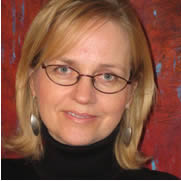 Bozena U. Zaremba is a bilingual journalist and translator. She has contributed to the Polish Daily News (Nowy Dziennik) and the Cosmopolitan Review. Her articles and interviews have also been published in Jazz Forum in Poland and in the Polish-Canadian Gazeta. She has interviewed over 40 renowned international pianists, musicians, writers and media personalities. She writes for the Chopin Society of Atlanta and serves as editor of its publication, Chopin Notes. Her translations into English include What I Received from God and People: A Story of Helena Modjeska by Joanna Sokołowska-Gwizdka and Radiation: A Tribute to Maria Skłodowska-Curie by Kazimierz Braun. In 2007, Ms. Zaremba was awarded a Civic Achievement Award by the Polish American Historical Association for her "Contribution to Furthering an Understanding of the Polish Experience in America." She holds an M.A. in English from the Jagiellonian University in Krakow, Poland, and is a graduate of the State School of Music in Krakow, where she studied voice. She lives with her family in South Florida.
Bozena U. Zaremba is a bilingual journalist and translator. She has contributed to the Polish Daily News (Nowy Dziennik) and the Cosmopolitan Review. Her articles and interviews have also been published in Jazz Forum in Poland and in the Polish-Canadian Gazeta. She has interviewed over 40 renowned international pianists, musicians, writers and media personalities. She writes for the Chopin Society of Atlanta and serves as editor of its publication, Chopin Notes. Her translations into English include What I Received from God and People: A Story of Helena Modjeska by Joanna Sokołowska-Gwizdka and Radiation: A Tribute to Maria Skłodowska-Curie by Kazimierz Braun. In 2007, Ms. Zaremba was awarded a Civic Achievement Award by the Polish American Historical Association for her "Contribution to Furthering an Understanding of the Polish Experience in America." She holds an M.A. in English from the Jagiellonian University in Krakow, Poland, and is a graduate of the State School of Music in Krakow, where she studied voice. She lives with her family in South Florida.





